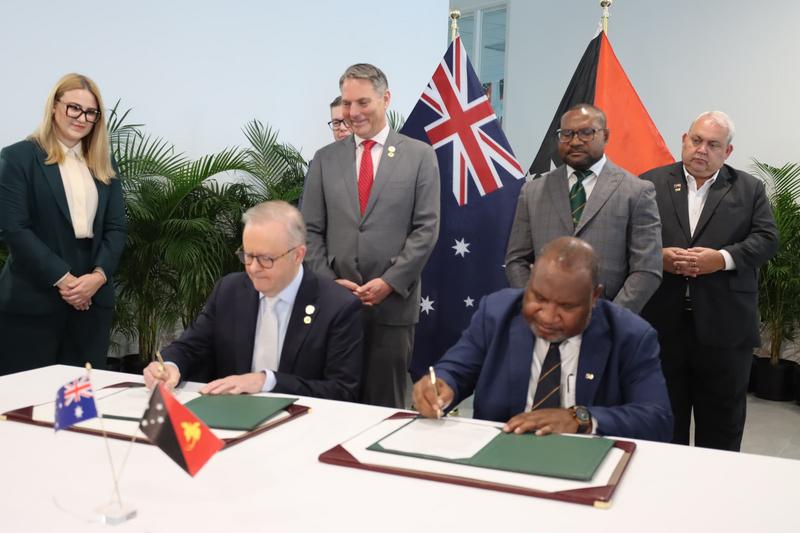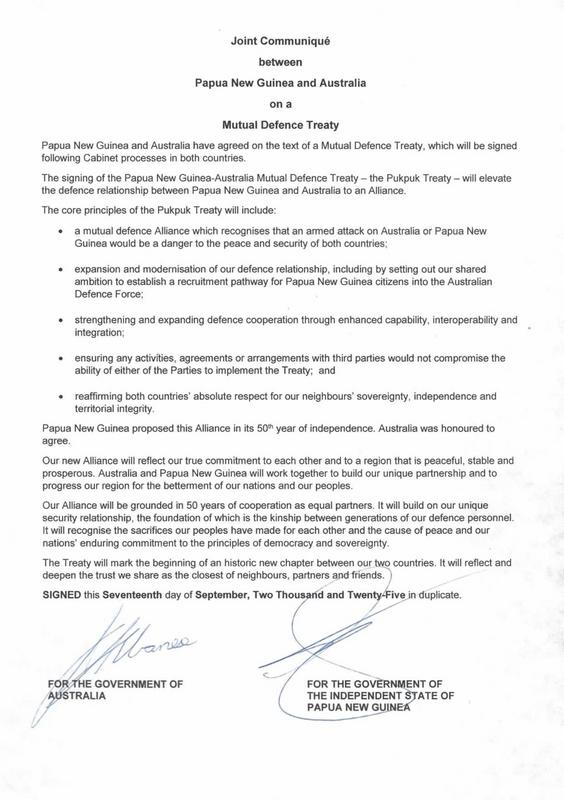Prime Minister James Marape has announced that Papua New Guinea and Australia have agreed on the text of a Mutual Defence Treaty, elevating the two nations’ security partnership to the highest level in their shared history.
The Treaty — to be known as the Pukpuk Treaty — will be formally signed after Cabinet processes in both Port Moresby and Canberra. It was unveiled following a bilateral meeting between Prime Minister Marape and his Australian counterpart Hon. Anthony Albanese at Melanesian Haus in Waigani, a day after Papua New Guinea celebrated its 50th Independence Anniversary.
A New Chapter in Bilateral Relations
PM Marape reflected on the symbolic timing of the announcement. “Yesterday we reflected on our 50 years of democracy, freedom and sovereignty. And in our reflections we identified our strengths and weaknesses. Government from now on into the first 20 years of our nationhood must work to fix those weak spots.
“One of these weaknesses is a rundown military that is not fit to defend 10 million-plus people in 462,840 square kilometres of land and over 3 million square kilometres of ocean space. We face theft of our fisheries, unaccounted-for vessels and planes encroaching our sovereign spaces, illegal border crossings and the trafficking of guns and drugs," he said.
“And as part of our reflection, we know for certain that our defence is not in good shape. Over time, successive governments have eroded the capacity of our Defence Force. We are now giving back priority to rebuilding the Defence Force at the earliest opportunity, along with rebuilding our Police Force and Correctional Service institutions. These will be restored so that they become the frontline defenders against external security threats, the protectors of our borders and key actors in restoring internal security — ensuring that we become a stronger and more secure people going forward into the future," he added.
Today, Marapa said that PNG take the first step into the next 50 years by cementing a security alliance with its closest neighbour and partner, Australia.
The Prime Minister emphasised that the decision was rooted in history and geography. “From the womb of Australia, we were birthed into our sovereign nationhood in 1975. Australia lowered its flag with dignity and we raised ours in dignity — our friendship remains. Fifty years on, Australia has never abandoned us. This Treaty reaffirms that bond — not as subservient partners but as equals, standing side by side and walking side by side," he said.

The Core Principles of the Pukpuk Treaty
The Pukpuk Treaty will establish a mutual defence alliance, recognising that an armed attack on either Australia or Papua New Guinea would endanger the security of both nations. Its core principles include:
-
Mutual Defence Commitment — recognising an attack on one would be a threat to both.
-
Expansion and Modernisation — deepening defence ties, including a recruitment pathway for Papua New Guineans into the Australian Defence Force.
-
Enhanced Capability and Interoperability — greater integration of defence forces, training and operations.
-
Protection of Sovereignty — ensuring agreements with third parties do not compromise the Treaty.
-
Regional Stability — reaffirming respect for the sovereignty and independence of neighbours across the Pacific.
Marape said the Treaty was proposed by Papua New Guinea as part of its Golden Jubilee year, with Australia honouring the request.
“This is our foresight and investment in long-term security. The Treaty is not for 2025 or 2026, but for generations to come. It secures PNG, Australia and our shared region in the Indo-Pacific," he said. "Because it is a Treaty, after Cabinets on both sides have cleared it, it will then go to Parliament for ratification. That is the process. If Parliament ratifies it, then the Treaty is affirmed and it will govern the administration of those relationships going forward.”
Building Defence and Internal Security
Marape acknowledged the current limitations of PNG’s defence capacity, noting the country cannot yet fully defend its vast land and maritime domains.
“God forbid, but if there were to be a war tomorrow — if someone were to invade Papua New Guinea — as your Prime Minister, as your number one defence man to defend this country, I must be frank: I do not yet have the gears to effectively defend our nation. That is why governments establish such strategic partnerships with forces of similar ethics, values and background. This Treaty ensures we work in tandem, hand in hand, without compromising our sovereign interests but always for the mutual benefit of our shared space and region," he said.
He further outlined his vision: “To every child of Papua New Guinea: your Prime Minister’s number one duty is to defend you. That is why I have made the conscious choice to make Australia our security partner of choice. Together, we will build a Defence Force of 7,000 personnel and a Police Force of 10,000 over the next decade, supported by a modern law and justice system.”
PM Marape also drew on international examples, stressing the importance of long-term security arrangements.
“You look at Israel today — Israel has had a longstanding security agreement with the USA for over 70 years. Under such covenants, nations sustain strong relationships for their mutual protection," he said. "In today’s world of many tensions and contests, both internal and external security are big considerations for any responsible government. Such arrangements act as a buffer, ensuring we step up to secure our borders and protect our people from external threats and internal challenges. They give us security.”
He said the Treaty would also address PNG’s pressing internal security challenges, working in tandem with policing, judiciary and community law and order improvement initiatives the Government is putting in place.

An Alliance of Equals
Both leaders stressed that the Alliance is grounded in respect and trust built over five decades.
“Our Alliance will reflect our true commitment to each other and to a region that is peaceful, stable and prosperous,” PM Marape said. “It builds on the kinship of generations of our defence personnel, the sacrifices made in the cause of peace and our enduring commitment to democracy and the defence of our respective sovereignties.”
He also acknowledged Australia’s broad support for PNG’s development, including youth employment, bilateral programmes and the forthcoming inclusion of a PNG team in the National Rugby League in 2028.
“At 50 years of independence, Australia remains head and shoulders above any other partner in supporting our growth. This Treaty is not just about defence; it is about prosperity, stability and preparing our children for the next 50 years," he added.
History in the Making
Prime Minister Albanese was joined in Port Moresby by Deputy Prime Minister Richard Marles and Minister for Defence Industry and Pacific Island Affairs Pat Conroy. PM Marape described their presence as “history in the making,” symbolising Australia’s deep affinity with PNG.
“The fact that Prime Minister Albanese has effectively relocated his Cabinet to Waigani for our 50th speaks volumes. Labour was with us in 1975 and Labour is with us today as we chart a new chapter together,” PM Marape said.
He concluded by calling the Treaty a defining moment for both nations:
“The Pukpuk Treaty is a pact between brothers, neighbours and equals. It ensures that when history tests us again, Papua New Guinea and Australia will stand — side by side — ready to defend our peoples, our sovereignty and our shared future," he said.










